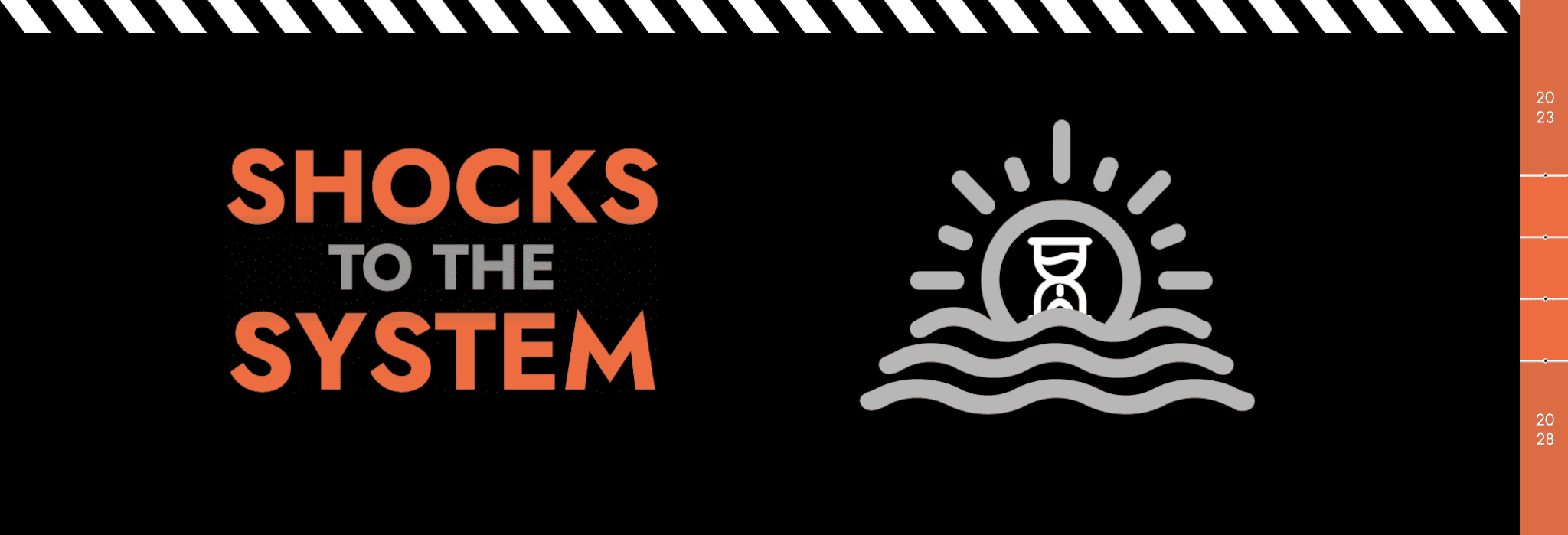
In our current “decade of disruption,” many global systems are becoming more vulnerable and volatile. Key systems such as food and energy, as well as groups such as businesses, organizations, and communities, need to be better equipped to understand and act in the face of a rapidly changing external landscape and respond to unpredictable — yet increasingly likely — shocks to the system.
For all the substantial progress that climate philanthropy has made over the past decade, it still lacks effective tools to regularly scan the horizon to identify and consider issues that could propel or hinder climate action. There is an unmet and essential need for climate philanthropy to look further, think differently, and prepare better, to be able to act more strategically when tectonic shifts occur globally.
Over the past several years, ClimateWorks and partners have sought to enhance collective capacities to anticipate how to factor events, trends, and exogenous factors and scenarios into climate action philanthropic strategies and investments. Examples of published work include Broadening the Dialogue: Exploring Alternative Futures to Inform Climate Action, Using futures analysis to develop resilient climate change mitigation strategies, and Philanthropic climate priorities under Covid-19 recovery scenarios.
In February 2023, ClimateWorks partnered with Forum for the Future to explore innovative ways to engage the climate philanthropy community on risks and opportunities out to 2028, to understand the implications of future trends for climate investment plans and optimize the potential positive impact of these plans. Together we developed a fast-paced immersive game entitled “Shocks to the System: Fast Forward to 2028” to test decision-making abilities based on macro trends and explore specific issues within different mindsets and trajectories.
Horizon scanning by Forum for the Future: Trajectories and signals of change
Horizon scanning is a practice of Futures in which we try to detect potentially important developments through a systematic practice of scanning for, and analyzing, potential risks and opportunities as they relate to a specific issue area. Forum for the Future uses horizon scanning to help organizations make sense of the changes happening in the wider world and understand how that change could cause shifts in their operating context.
A critical part of horizon scanning is to identify ‘signals of change.’ Signals of change are seeds of a possible future. They represent any development, idea, or innovation that points to a future possibility different from today’s norm. Of particular interest are signals that point to the possibility of significant future change or illuminate an aspect of ongoing change. Signals help us think through the future more expansively and to anticipate unintended consequences of developments we can see signs of today.
During 2020 we witnessed one of the largest pandemics of our lifetime and the pace of change seemed to speed up as systems like education, healthcare, and food delivery were all disrupted. As a way to help track and make sense of this change, Forum created a set of future trajectories — four possible pathways that are linked to different mindsets about the future.
The deepest point of intervention in the system is our mindset. Goals, power structure, rules, and culture all arise out of mindset. Our mindset shapes how we interpret and engage with signals of change, and the signals that rise to the top, in turn, shape our mindsets. This was certainly the case during the pandemic when certain developments led to a scarcity mindset over one of abundance, resilience, and transformation.
Shocks to the System: Fast Forward to 2028
The repercussions from recent global events and trends — including the Covid-19 pandemic, the war on Ukraine, unexpected national elections, and rising and persistent inflation — have intensified philanthropic funders’ interest in enhancing horizon scanning capacities and exploring tools to test the resilience of strategies. As we face an increasingly uncertain and unpredictable future, businesses, governments, and philanthropic organizations must develop strategies that are more resilient and broader in scope than ever before, as seemingly external factors have the power to fundamentally shift systems.
So, how do we build more foresight and resilience into our strategies to enable better decision-making about the future? We turned to Forum’s trajectories to provide a framework for understanding and interpreting trends, how they interact, and how they might evolve. We took Forum’s established trajectories, played them out to 2028, and updated them to include trends and signals around global food price shocks and minerals critical to the energy transition as two areas that have seen significant changes in a short period of time and are likely to cause significant impact on climate action. Based on interviews and desk research, the updated trajectories explored the macro trends underpinning shocks across the globe and gave way to potential pathways.
Rather than a traditional report, we sought to convey this information in a format befitting the volatility and rapid pace of the topic. For this reason, we determined that a short, immersive game would be the best way to engage the climate funding community in an interactive and creative way. Additionally, making the game free and accessible through a downloadable format ensures that people and organizations who wish to explore similar issues can benefit from our research and thinking.
Shocks to the System is a game about high-stakes decision-making with limited information and how the trajectories of those decisions play out into the future. Decision-makers in philanthropy have to make important decisions regarding where in a system to intervene, what interest groups they might be impacting, and how risky an intervention is in the likelihood of succeeding or the time needed to scale. We tried to capture these aspects of decision-making in the game.
Philanthropy can use the game in a few ways:
- To start or re-energize a conversation about climate funding priorities
- To experience high-stakes decision-making and the futures mindsets associated with those decisions
- To explore complex intervention points that we face today, specifically around food prices and minerals for the energy transition
We hope that by playing the game, participants can surface tensions and assumptions about the future. The game is intended to be paired with a longer conversation about why certain decisions were made, and the complexity and climate impact of food prices and minerals for the energy transition, in order to bring more resilience to future decisions.
Next steps for horizon scanning: three insights to take forward
As we continue to explore how we collectively enhance the philanthropic community’s horizon-scanning capabilities, we share three key insights that we’ve learned so far.
Exploring all types of horizon scanning. We developed the Shocks to the System game as an experimental, new way to explore future risks and opportunities and how we factor these into more strategic decision-making. Next, we need to explore all types of horizon scanning to expand our collective toolsets and frameworks. The goal of horizon scanning is not to forge one path for climate funders. Instead, it is to examine key insights from non-traditional lenses, challenge group thinking, and identify gaps or risks in individual or collective strategies on the basis of possible/probable futures.
Collecting, tracking, and interpreting signals of change. The future is inherently uncertain. While many future changes will be unpredictable, beginning to systematically collect and monitor ideas, trends, risks, and innovations, across different sectors and regions, and thinking through how these developments might point us to futures different from today’s norm can help to be better prepared. Tracking signals of changes in collaboration with others can give us a wider view of the future, help us to start to develop a playbook for how we might respond to shocks, and expose gaps and risks that might exist in our current strategies and where we might need to be more resilient.
Listening to different voices. Risk events can happen at any time and from anywhere. Many of these shocks will come from outside of the climate space. Effective horizon scanning tools and frameworks must engage with a diverse range of expertise and intelligence from a variety of non-climate disciplines. Furthermore, it is critical to monitor and understand signals of change that are happening across different regions — how we translate macro-level trends to implications at the country level, and how regional developments and dynamics might cause large-scale disruptions at the global level. To this end, working and learning from partners in different regions and contexts will also be an important component of our horizon-scanning efforts going forward.
We invite you to explore the Shocks to the System: Fast forward to 2028 game.
About Forum for the Future
As a leading international sustainability non-profit, Forum uses expertise in futures and system change to help catalyse change on key global challenges: the climate crisis; transforming our food systems; and sustainable value chains and livelihoods. We work in partnership with businesses, governments, and civil society to accelerate the shift to a more sustainable future.


